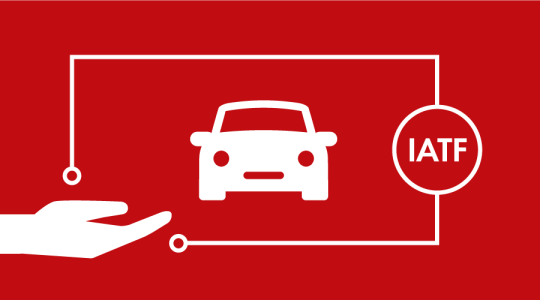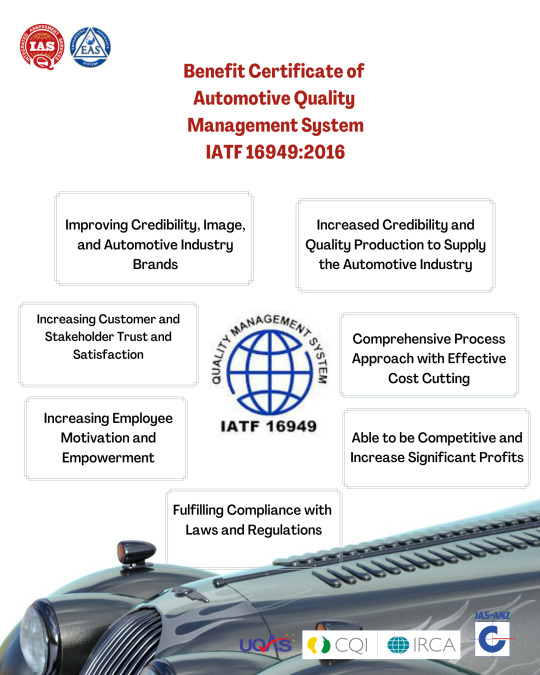#IATF 16949
Text
IATF 16949 Awareness Training: Drive Automotive Excellence with 4C Consulting

Elevate your organization's automotive quality management with our IATF 16949 Awareness Training. At 4C Consulting, a leading ISO Certification Consulting company, we bring a wealth of expertise, having successfully implemented ISO Standards at over 2000 clients, backed by 10,000+ hours of impactful ISO Training.
Our IATF 16949 Awareness Training is designed to demystify the complexities of the automotive quality management system. We understand the significance of fostering awareness among your team to ensure compliance and excellence in the automotive industry. The training covers key aspects of IATF 16949, equipping participants with a solid foundation in its principles, requirements, and benefits.
By choosing our IATF 16949 Awareness Training, you empower your team to navigate the automotive quality landscape confidently. From understanding core concepts to practical applications, our training sets the stage for enhanced operational efficiency and compliance.
Partner with 4C Consulting to propel your organization towards automotive excellence through our comprehensive IATF 16949 Awareness Training. Gain the knowledge, confidence, and competitive edge needed in the dynamic automotive industry. Contact us for more information.
0 notes
Text

Was macht ein PSCR Produktsicherheitsbeauftragter? - Aufgaben & Kompetenzen
Ein Produktsicherheitsbeauftragter (PSCR) ist eine Person in einem Unternehmen, die für die Gewährleistung der Produktsicherheit verantwortlich ist. Die Abkürzung PSCR steht dabei für den englischen Begriff "Product Safety and Conformity Representative". Produktsicherheit bezieht sich dabei auf die Maßnahmen und Standards, die entwickelt wurden, um sicherzustellen, dass Produkte, die auf dem Markt angeboten werden, keine unangemessenen Gefahren für die Verbraucher, Benutzer oder die Umwelt darstellen. Sie ist ein wichtiger Aspekt des Verbraucherschutzes und der öffentlichen Gesundheit.
Hier weiterlesen: https://www.vorest-ag.com/Automotive-IATF-16949-VDA/Wissen/pscr-produktsicherheitsbeauftragter-aufgaben
0 notes
Text
IATF 16949 vs. ISO 9001: Understanding the Key Differences
IATF 16949 vs. ISO 9001: Understanding the Key Differences
Both IATF 16949 and ISO 9001 are internationally recognized quality management standards, but they cater to different industries and have unique requirements. Here's a breakdown of the key differences between IATF 16949 and ISO 9001:
1. Industry Focus:
ISO 9001: It is a generic quality management standard applicable to various industries and organizations of any size.
IATF 16949: Specifically designed for the automotive industry, addressing the unique challenges and requirements of automotive manufacturers and suppliers.
2. Applicability:
ISO 9001: Suitable for all types of organizations, regardless of their involvement in the automotive sector.
IATF 16949: Primarily intended for organizations in the automotive supply chain, including manufacturers, suppliers, and service providers.
3. Customer-Specific Requirements:
ISO 9001: Focuses on meeting customer requirements but doesn't specify industry-specific customer requirements.
IATF 16949: Includes additional requirements that are specific to the automotive industry, reflecting the expectations of automotive OEMs (Original Equipment Manufacturers).
4. Product Safety:
ISO 9001: While it emphasizes the need to meet customer requirements, it doesn't explicitly address product safety.
IATF 16949: Places specific emphasis on product safety, reflecting the critical nature of safety considerations in the automotive industry.
5. Risk-Based Thinking:
ISO 9001: Encourages a general approach to risk-based thinking.
IATF 16949: Requires a more detailed and specific focus on risk management, including the identification and mitigation of risks related to the automotive supply chain.
6. Process Approach:
ISO 9001: Emphasizes a process approach to quality management.
IATF 16949: Extends the process approach to include a more detailed focus on specific automotive processes and requirements.
7. Product Development:
ISO 9001: Addresses product realization processes in a general sense.
IATF 16949: Includes more detailed requirements for product development and validation processes, reflecting the complexity of the automotive product development lifecycle.
8. External Certification Bodies:
ISO 9001: Can be certified by various accredited certification bodies.
IATF 16949: Requires certification through specifically accredited bodies recognized by the International Automotive Task Force (IATF).
9. Change Management:
ISO 9001: Requires organizations to manage changes to the quality management system.
IATF 16949: Places a stronger emphasis on change management, especially in the context of automotive processes and products.
Understanding these key differences is crucial for organizations in the automotive industry as they navigate the complexities of quality management. While both standards share common elements, the industry-specific focus of IATF 16949 sets it apart and addresses the distinct challenges faced by automotive manufacturers and suppliers.
0 notes
Text
WHAT IS IATF 16949 CERTIFICATION?
IATF 16949:2016 specified requirements for automotive suppliers and has been written and adopted by the industry as the new international quality management system. IATF 16949 certification specifies the quality management system requirements for the design/development, production, installation and servicing of all automotive-related products.
IATF 16949 goals are :
Customer specific requirements
Requirements related to safety and the environment, in addition to quality
Requirements for Supplier Development
Cross functional approach for implementation
Advanced product quality planning – APQP,
PPAP,
FMEA & Control Plan,
MSA & SPC
0 notes
Text
How many procedures are there in IATF 16949?
The IATF 16949 standard does not specify a specific number of procedures that must be implemented by organizations. Instead, it requires that organizations establish and maintain a quality management system that meets the requirements of the standard.
The IATF 16949 standard specifies a set of requirements that organizations must meet to ensure the effectiveness of their quality management system. These requirements cover a wide range of topics, including leadership, risk management, product design and development, supplier management, process control, measurement, analysis, and improvement.
To meet these requirements, organizations typically develop a set of procedures that describe how they will implement the requirements of the standard in their specific business context. The number of procedures required will vary depending on the size and complexity of the organization, as well as the scope of its quality management system.
0 notes
Text
IATF 16949 vs. ISO 9001: Understanding the Automotive Quality Management Standard

Quality management systems are foremost in guaranteeing item reliability, consumer satisfaction, and generally functional greatness. For organizations working in the auto business, adherence to explicit norms is vital to meet the rigid requirements of this perplexing and cutthroat area. Two key standards that frequently come into the center are IATF Certification and ISO 9001.
In this article, we'll dig into the vital contrasts between these norms, underscoring how IATF 16949 expands upon the establishment laid by ISO 9001.
IATF 16949 Certification and ISO 9001 are both quality management norms that assist organizations with further developing item quality and meeting client expectations. Nonetheless, they have various extensions and highlights on various parts of quality management:
Understanding IATF 16949
This standard is intended for the auto business and depends on the construction of ISO 9001. It centers around customer-explicit prerequisites and is pertinent to locales that produce parts for vehicle gathering or service parts, not resellers' exchange parts.
Understanding ISO 9001
This standard is a conventional quality management system that can be applied to any association, paying little heed to estimates or products/services. It centers around consumer loyalty and applies to all locales of the association.
Scope and Applicability:
ISO 9001: ISO 9001 is a nonexclusive QMS relevant to different enterprises. It sets out the rules for a quality management system, underlining consumer satisfaction, process proficiency, and nonstop improvement.
IATF 16949: IATF 16949 is well-defined for the auto business. Created by the International Automotive Task Force (IATF), it lines up with ISO 9001 however incorporates extra prerequisites custom-made to the auto area.
Customer-Specific Requirements:
ISO 9001: While ISO 9001 urges organizations to consider IATF 16949 Requirements, it doesn't recommend explicit auto industry-related measures.
IATF 16949: IATF 16949 consolidates customer explicit necessities, mirroring the remarkable requests of the automobile production network. This guarantees that automakers and providers live up to the expectations of their industry stakeholders.
Process Approach:
ISO 9001: Both ISO 9001 and IATF 16949 embrace the process approach, stressing the significance of understanding and overseeing interconnected exercises as a system.
IATF 16949: IATF 16949 expands the process approach by consolidating a risk-based analysis system, stressing the recognizable proof and relief of dangers all through the auto store network.
Product Safety and Traceability:
ISO 9001: ISO 9001 puts an overall accentuation on item conformity yet doesn't unequivocally address item safety or detectability necessities.
IATF 16949: IATF 16949 Latest Version acquaints explicit conditions related to item security and recognizability, perceiving the basic significance of these viewpoints in the car business, where safety is the principal.
Change Management:
ISO 9001: ISO 9001 expects organizations to control changes to the QMS yet doesn't recommend itemized change management processes.
IATF 16949: IATF 16949 incorporates explicit necessities for change management, especially concerning production, service parts, and tooling changes. This mirrors the automobile business' requirement for thorough change control to keep up with product quality and safety.
Customer Satisfaction and Performance Monitoring:
ISO 9001: ISO 9001 accentuates consumer satisfaction yet doesn't endorse explicit measurements or strategies for observing and further developing consumer loyalty.
IATF 16949: IATF 16949 incorporates prerequisites for organizations to gauge and screen consumer loyalty, giving a more organized way to deal with understanding and further developing client connections in the auto area.
Essential Difference between ISO 9001 and IATF 16949
Generally, IATF Certification is a QMS standard explicitly for the auto area yet satisfies the fundamental measures of ISO 9001. IATF 16949 was made to synchronize the certificate overall for all auto supply chains and evaluations. Curiously, nonetheless, the IATF is a report that wouldn't exist without ISO 9001. This essential contrast between ISO 9001 and IATF 16949 ought to be perceived.
As we have noted previously, the situations and models of IATF 16949 should be executed related to ISO 9001, making it an extra arrangement of prerequisites. This signals a vital contrast between ISO 9001 and IATF 16949 in any event when the two systems have the fundamental capability of further developing encounters, items, and processes.
Achieving Quality Requires an Effective Quality Management System
At the point when you have a legitimate and executed Quality Management System in your association, you can use different advantages like:
Smoothed out and controlled processes
Reduced wastage and free time
Lesser possibility of costly errors, for example, product review
Brought down expenses of value
Distinguishing and satisfying training requirements
Expanded representative commitment
Ceaseless upgrades and process arrangement with quality goals
Smoother communication and coordinated effort to dispense with irregularities
Choosing the right standard:
If you are an automotive supplier: IATF Certification is compulsory and fundamental for working with significant automakers.
If you are not in the automotive industry: ISO 9001 can be a decent decision for exhibiting your obligation to quality and further developing your general quality management system.
If you are unsure: Consider factors like your industry, your customer necessities, and your financial plan while going with a choice.
Conclusion:
While ISO 9001 fills in as a primary norm for quality management across different ventures, IATF Certification designs these standards to the particular necessities and challenges of the auto area. Auto organizations looking for certification should comprehend how IATF 16949 increases and improves the more extensive ISO 9001 structure, guaranteeing that their QMSs align with industry-explicit necessities.
By embracing IATF 16949, organizations measure up to regulatory assumptions as well as position themselves to flourish in the cutthroat and dynamic of the automobile sector.
#IATF Certification#IATF 16949 Certification#International Automotive Task Force#IATF 16949 Requirements#IATF 16949 Latest Version
0 notes
Text
Navigating the Road to IATF 16949 Certification: Driving Quality Excellence in Automotive Industry
Introduction to IATF 16949 Certification
In the highly competitive automotive industry, quality management systems play a critical role in ensuring the delivery of safe and reliable vehicles to consumers worldwide. The International Automotive Task Force (IATF) 16949 certification sets the standard for quality management systems in the automotive sector. This certification is recognized globally and is essential for automotive manufacturers and their supply chain partners.
Understanding the Importance of IATF 16949 Certification
Enhancing Product Quality and Safety: IATF 16949 certification emphasizes a proactive approach to quality management, focusing on preventing defects and errors rather than simply detecting them after production. By adhering to the rigorous requirements of this standard, automotive companies can enhance the quality and safety of their products.
Meeting Customer Requirements:Automotive manufacturers must comply with the specific quality standards and requirements of their customers, which often include OEMs (Original Equipment Manufacturers). Achieving IATF 16949 certification demonstrates a company's commitment to meeting or exceeding these customer expectations, fostering trust and long-term relationships.
Driving Continuous Improvement:Continuous improvement is a core principle of IATF 16949 certification. By implementing processes for identifying areas of inefficiency or non-conformity, automotive companies can systematically address these issues and drive ongoing improvements in quality, efficiency, and customer satisfaction.
Key Elements of IATF 16949 Certification
Process Approach: IATF 16949 certification requires organizations to adopt a process approach to quality management. This involves identifying and managing interconnected processes within the organization to achieve desired outcomes efficiently.
Risk-Based Thinking:A key feature of IATF 16949 is the emphasis on risk-based thinking. Automotive companies are required to assess and address risks and opportunities throughout their operations, particularly concerning product quality, safety, and regulatory compliance.
Customer-Specific Requirements:IATF 16949 certification incorporates customer-specific requirements, ensuring that automotive suppliers meet the unique quality standards and expectations of their clients. This includes requirements related to product design, manufacturing processes, and service delivery.
Benefits of IATF 16949 Certification
Enhanced Credibility and Reputation:IATF 16949 certification enhances an organization's credibility within the automotive industry and among its customers. It serves as a tangible demonstration of the company's commitment to quality and continuous improvement.
Access to New Markets: IATF 16949 certification is recognized and accepted by automotive manufacturers worldwide. For suppliers seeking to expand their business globally, this certification opens doors to new markets and opportunities for collaboration.
Operational Efficiency and Cost Savings: By implementing robust quality management systems, organizations can streamline their operations, reduce waste, and minimize the risk of defects and recalls. This results in improved operational efficiency and significant cost savings over time.
Conclusion
IATF 16949 certification is a testament to an organization's dedication to quality, customer satisfaction, and continuous improvement in the automotive industry. By adhering to the stringent requirements of this standard, companies can strengthen their competitive position, drive innovation, and ensure the delivery of safe and reliable vehicles to consumers worldwide.
0 notes
Text
IATF 16949 still mandates that organizations include a Quality Manual in their QMS (Quality Management System) documentation, even though the most recent version of ISO 9001 no longer has the requirement to document the Quality Manual (for additional information, see: The future of the Quality Manual in ISO 9001:2015).
Given the significance of the Quality manual, a lot of businesses take the "more is better" stance, which is completely at odds with what the manual stipulates as essential and anticipated. Frequently, the manual is just the usual wording with "you shall" changed to "we will," adding no value to the business or the QMS. That must have been one of the reasons ISO 9001 stopped requiring it.
#iatf 16949 documents#iatf 16949 certification#iatf 16949 manual#iatf 16949 documentation#iatf 16949 documentation procedures
0 notes
Text
Driving Excellence: IATF 16949 Training by 4C Consulting for Automotive Quality Management

Unlock automotive excellence with 4C Consulting Private Limited's IATF 16949 Training. As a leading ISO Certification Consulting company, we bring a wealth of experience, having successfully implemented ISO Standards at over 2000 clients, with over 10,000 hours dedicated to ISO Training.
Our IATF 16949 Training is designed to elevate your organization's quality management system to meet the stringent requirements of the automotive industry. Delve into comprehensive modules tailored to enhance your team's understanding of IATF 16949, covering key aspects such as process efficiency, risk management, and continuous improvement.
Why opt for IATF 16949 Training? In the competitive automotive sector, adherence to this standard is essential for ensuring product quality, customer satisfaction, and regulatory compliance. Our training not only meets but exceeds industry benchmarks, empowering your team to navigate the complexities of IATF 16949 with confidence.
At 4C Consulting, we go beyond theoretical concepts, providing practical insights and real-world applications. Trust us to be your partner in achieving and maintaining IATF 16949 compliance, enhancing your organization's reputation and competitiveness in the automotive market. Choose 4C Consulting for IATF 16949 Training that drives performance and quality in every aspect of your automotive operations. Contact us for more information.
0 notes
Text

IATF 16949:2016 Internal Auditor Training Course Internal Auditor courses crosswise over India and the Middle East, for example, in Dubai, Qatar ext.
You’ll be ready for real-life audits as soon as the class is over and, in fact, we strongly suggest that you capitalize on your successful classroom experience by having an audit planned for as soon as you return to your facility.
iatf 16949 internal auditor training
0 notes
Text
Every customer seems to have the same consistent expectations: faster, less wasteful delivery of higher-quality components. How, therefore, can an auto supplier fulfil these constantly evolving obligations? With a focus on methodical procedures, enhanced customer satisfaction, and ongoing improvement, the IATF 16949 certification provides a clear foundation for creating a quality management system (QMS) that satisfies client expectations. IATF 16949 certification gives numerous advantages for the Automotive industry. In this article, we mention some advantages of IATF 16949.
#iatf#iatf documents#iatf 16949 documents#iatf 16949 documents kit#editable iatf 16949 documents#iatf 16949 documents packages
0 notes
Text
IATF 16949 Certification | ISO 16949 Certification Consultant in Mumbai, India | PQSmitra
Experience a higher level of automotive excellence with IATF 16949 Certification, a globally recognized standard for quality management in the automotive industry. At PQSmitra, we are your trusted ISO 16949 Certification Consultant located in the vibrant city of Mumbai, India.
IATF 16949 Certification is designed to enhance the quality, efficiency, and overall performance of automotive supply chains. It ensures that your organization complies with rigorous standards, resulting in improved product quality, reduced defects, and increased customer satisfaction.
Our dedicated team of experts at PQSmitra possesses in-depth knowledge and extensive experience in guiding businesses through the certification process. We work closely with automotive manufacturers, suppliers, and service providers to help them meet the stringent requirements of IATF 16949.
By choosing PQSmitra as your certification partner, you can expect:
Expert Guidance: Our consultants provide valuable insights and guidance to align your processes with IATF 16949 standards, ensuring a smooth certification journey.
Efficient Process: We streamline the certification process, helping you save time and resources while achieving compliance with industry standards.
Enhanced Quality: IATF 16949 certification leads to improved quality control, reducing defects, and ultimately, boosting your reputation in the automotive sector.
Global Recognition: Certification opens doors to new markets and business opportunities, as IATF 16949 is recognized worldwide.
Customer Trust: Meeting these high standards instills confidence in your customers, demonstrating your commitment to delivering quality automotive products and services.
Competitive Advantage: Stand out in a competitive market by showcasing your dedication to excellence through IATF 16949 certification.
Elevate your automotive quality standards today with PQSmitra as your partner. Our mission is to empower your organization to thrive in the demanding automotive industry by achieving and maintaining IATF 16949 Certification. Contact us to embark on your journey towards automotive excellence.
0 notes
Text
IATF 16949:2016 Certification Consultants | 4C Consulting
IATF 16949:2016 specified requirements for automotive suppliers and has been written and adopted by the industry as the new international quality management system. IATF 16949 certification specifies the quality management system requirements for the design/development, production, installation and servicing of all automotive-related products.
This specification focuses on
Customer specific requirements
Requirements related to safety and the environment, in addition to quality
Requirements for Supplier Development
Cross functional approach for implementation
Advanced product quality planning – APQP,
PPAP,
FMEA & Control Plan,
MSA & SPC

IATF 16949:2016 specification are prepared by a group of vehicle manufacturers known as the International Organization for Standardization (IATF). The IATF consists of General Motors Corporation, BMW Group, Fiat Auto, Ford Motor Company, DaimlerChrysler, PSA Peugeot-Citroen, Renault SA and Volkswagen, plus national trade associations, AIAG (America), VDA (Germany), SMMT (UK), ANFIA (Italy) and FIEV (France)
On Road Automobile manufacturers are making IATF 16949 certification a mandatory requirement or encouraging their suppliers to upgrade to the new technical specification.
This specification replaces existing US, German, French and Italian automotive quality system standards, including QS-9000, VDA6.1, EAQF and ASQ.
TRAINING
We offer a customized IATF 16949 training program.
0 notes
Text
Does IATF require PPAP?
The IATF 16949 standard specifies a set of requirements that organizations must meet to ensure the effectiveness of their quality management system. These requirements cover a wide range of topics, including leadership, risk management, product design and development, supplier management, process control, measurement, analysis, and improvement.
One of the requirements of IATF 16949 is the use of the Production Part Approval Process (PPAP) to demonstrate that suppliers can consistently produce parts that meet customer requirements. PPAP is a standardized process used by the automotive industry to ensure that suppliers have properly understood and implemented the customer's design and manufacturing requirements.
Therefore, IATF 16949 does require the use of PPAP to ensure that suppliers can consistently produce parts that meet customer requirements.
0 notes
Text
The Importance of IATF 16949 Certification in the Automotive Industry

The auto business remains a mainstay of mechanical headway and purchaser interest, driving development and forming how we move. Amid this unique scene, quality administration becomes the principal, guaranteeing that vehicles satisfy tough guidelines for well-being, dependability, and effectiveness. One key component that assumes a significant part in keeping up with these principles is the IATF 16949 Certification.
The Foundation of Automotive Excellence
IATF 16949 isn't simply a certificate; it is a quality management system explicitly intended for the automotive region. This standard was created by the International Automotive Task Force (IATF) in a joint effort with the International Organization for Standardization (ISO). It replaces the past ISO/TS 16949, and sets the structure for a vigorous quality administration framework custom-made to car assembling and supply chains.
A Short History of the IATF 16949 Certification
The IATF 16949 certification was made in 1999 by the International Automotive Task Force (IATF), a consortium of automobile exchange affiliations and makers working related to the ISO. As per the IATF, the requirements set out inside the ISO IATF Certification were made to carry solidarity to the entirety of “the different evaluation and certificate frameworks overall in the store network for the car area.”
The IATF Accreditation has since gone through different updates to reflect changes in the auto business guidelines. The latest emphasis of the archive was distributed in 2016 as the IATF 16949:2016.
Getting this certification means to the auto business that service systems are prepared to ceaselessly fabricate quality link congregations and outfits. Further, the certification perceives our unrivaled mastery in planning a variety of standard and adjustable link get-togethers and tackling items that can satisfy our client's needs in the car business.
What is the IATF 16949 Certification, and Why is it Important?
The IATF 16949 certificate is a legal identification for organizations that are liable for making and providing auto components or congregations to the auto business. At the point when an organization accomplishes an IATF 16949 Certification, it implies various excellent grades about its item to an imminent purchaser.
As per the internationally certified certification body, National Quality Assurance Limited (NAQ), the IATF certificate uncovers that an organization has fostered a “cycle situated quality administration framework that accommodates constant improvement, imperfection counteraction and decrease of variety and waste.” Laying out this framework preferably prompts a creation interaction that reliably produces grade-level auto parts and congregations.
Importance of Following IATF Standards, Further Explained!
Those in the auto business need to observe both IATF and ISO guidelines. This isn't just for compliance, but additionally for guaranteeing that every single auto part and item is of top-notch at standard with global guidelines and is ok for use. ISO and IATF principles put quality and security at the front line of their rules, guaranteeing that all results would be okay for both the clients and the organizations creating them.
How Can I get IATF Certification in UAE: Adhering to IATF guidelines is particularly important to acquire certification. IATF themselves don't offer IATF licenses, yet there are external examiners or authorization bodies perceived by the IATF that do the certification for them. Each IATF declaration is legitimate for quite a certain time frame, and toward the finish of those valid years, entrepreneurs will be expected to petition for another one.
Having a declaration can likewise be extremely gainful to a business as far as drawing in clients and potential colleagues. Being IATF-certified can show that the entrepreneurs and their representatives care about quality and that they follow all security methodologies previously, during, and after creation. This is vital in business-to-deals also, a few organizations decide to just execute with IATF-certified organizations to guarantee themselves of the nature of their items.
Getting the IATF 16949 Certification exhibits that your organization has met broad requirements to make a course of nonstop improvement with an accentuation on deformity counteraction and a decrease of variety and waste in the store network.
The specialized determination acquired from an IATF certification is executed for all parts of manufacturers and providers of items or creation materials, administrations. This includes like intensity therapy or stirring, and different items indicated via car clients like the constituent pieces of vehicles.
Affirmation of this specialized determination is perceived by driving automakers and OEMs. Most driving producers will just work with organizations that hold IATF 16949 certificates, as they demand that providers stick to the severe specialized particulars spread out in the norm.
Conclusion: Driving Quality, Safety, and Excellence
In the speedy and profoundly serious auto industry, IATF 16949 Certification fills in as a signal directing organizations toward greatness. It gives a normalized structure that not only meets the severe prerequisites of the auto area but also cultivates a culture of consistent improvement and consumer loyalty.
As vehicles become more refined and buyer assumptions rise, the significance of IATF 16949 in maintaining the best expectations in auto fabricating is more basic than at any other time. Embracing this certification isn't simply a decision; it is a pledge to drive quality, safety, and excellence out and about ahead.
#IATF 16949 Certification#International Automotive Task Force -1#How Can I get IATF Certification in UAE
0 notes